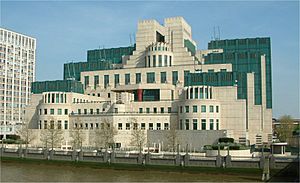Intelligence agency facts for kids
An intelligence agency is a government agency that gathers and studies information. Their main job is to help protect a country's national security. They also support law enforcement, the military, and foreign policy goals.
These agencies collect information in many ways. Some methods are open and easy to see, while others are secret. They might use espionage (spying), listen to communications, or break secret codes. They also work with other groups and read public information.
The information they gather is then studied and understood. This process is called intelligence analysis or assessment. It helps governments make important decisions.
Intelligence agencies offer several key services to their country:
- They provide important analysis about a country's safety.
- They give early warnings about possible problems or dangers.
- They help manage big problems by understanding what other countries might do.
- They inform plans for national defense and military operations.
- They protect secret information about their own work and other government groups.
- They work secretly to help their country's interests.
- They defend against spying from other countries. This is called counter-intelligence.
There are two main types of intelligence:
- Security intelligence deals with threats inside the country. This includes things like terrorism or spying by foreign agents.
- Foreign intelligence collects information about other countries. This could be about their politics or economy.
Sometimes, these agencies get secret information by spying or copying hidden documents. Other times, they simply read all the public information available. In many democratic countries, a lot of important information is published openly.
To find secret information, these groups might use espionage. They also intercept signals, like tapping phones or hacking computers. They also use cryptanalysis to break secret codes. All this information is then put together and analyzed.
Sometimes, intelligence agencies have been involved in secret actions. These actions are meant to support their country's interests. They might include spreading false information to influence events.
Contents
Famous Intelligence Agencies
Many countries have their own intelligence agencies. Here are some well-known examples from the United Kingdom and the United States.
United Kingdom Agencies
- SIS (also known as MI6): This agency collects intelligence from other countries. They are the main foreign intelligence service for the UK.
- Security Service (also known as MI5): This group protects the UK from threats inside the country. They work on counter-intelligence against foreign spies and terrorism.
- GCHQ: This agency intercepts and decodes electronic communications. They then share this important information with other intelligence groups.
- Joint Intelligence Committee: This committee brings together intelligence from all agencies. They then inform the government about what is happening around the world.
United States Agencies
The United States has many intelligence groups, about 17 major ones. Here are some of the most important:
- CIA: The CIA focuses on spying on foreign countries. They also take secret actions against threats to the U.S. outside its borders.
- Defence Intelligence Agency: This agency provides military intelligence to the U.S. Department of Defense.
- Homeland Security: This department works to protect the U.S. from terrorism at home. They also help during natural disasters.
- United States Intelligence Community: This is a group that coordinates all the different U.S. intelligence agencies. It is led by the Director of National Intelligence.
Images for kids
-
The HQ of UK signals intelligence activities is Government Communications Headquarters, Cheltenham
-
The headquarters of the Finnish Security Intelligence Service or SUPO in Punavuori, Helsinki
See also
 In Spanish: Servicio de inteligencia para niños
In Spanish: Servicio de inteligencia para niños
 | Aurelia Browder |
 | Nannie Helen Burroughs |
 | Michelle Alexander |





